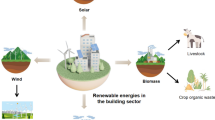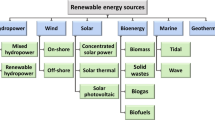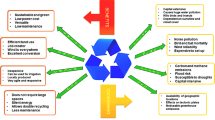Abstract
This research delves into the economic impacts of integrating strategic innovation in environmental policy-making to advance sustainable energy investments, utilizing sophisticated hybrid fuzzy modeling techniques. The study improves the precision of inter-criteria relationships by systematically evaluating critical criteria through DEMATEL and quantum picture fuzzy rough sets. It ranks innovative environmental decision-making options for sustainable energy financing within the TOPSIS framework. A breakthrough is identifying key economic indicators that bolster environmental policy effectiveness via a priority analysis, blending quantum theoretical principles with picture fuzzy rough sets for methodological innovation. The findings highlight the critical economic role in enhancing innovative environmental strategies through adept environmental and energy policy formulation and execution. These policies must prioritize renewable energy sources for sustainable capital deployment, alongside investments in energy storage and smart grid technologies. The study recommends immediately adopting innovative renewable energy policies and hybrid strategies to overcome economic challenges and enable cost efficiencies. Moreover, this research underscores the intersection of sustainable development and growth, advocating for government subsidies to promote strategic initiatives that spur renewable energy projects. Such incentives are vital for economic development, job creation, technological innovation, and energy security, reinforcing the link between environmental sustainability and economic prosperity. This approach suggests that sustainable energy policies are essential for achieving long-term economic and environmental objectives, highlighting their significance in fostering a sustainable future.

Similar content being viewed by others
References
Afghah, M., Sajadi, S. M., Razavi, S. M., & Taghizadeh-Yazdi, M. (2023). Hard dimensions evaluation in sustainable supply chain management for environmentally adaptive and mitigated adverse eco-effect environmental policies. Business Strategy and the Environment, 32(7), 5044–5067. https://doi.org/10.1002/bse.3407
Afshan, S., Yaqoob, T., Meo, M. S., & Hamid, B. (2023). Can green finance, green technologies, and environmental policy stringency leverage sustainability in China: Evidence from quantile-ARDL estimation. Environmental Science and Pollution Research, 30(22), 61726–61740.
Akram, Z., & Ahmad, U. (2023). A multi-criteria group decision-making method based on fuzzy rough number for optimal water supply strategy. Soft Computing, 1–26.
Al-Binali, T., Aysan, A. F., Dınçer, H., Ünal, İM., & Yüksel, S. (2023). Serving SDGs via bank mergers: A neuro quantum fuzzy approach for Qatari Banks. IEEE Access, 11, 68744–68759. https://doi.org/10.1109/access.2023.3292238
Alinda, K., Tumwine, S., & Kaawaase, T. K. (2024). Environmental innovations and sustainability practices of manufacturing firms in Uganda. Asia Pacific Journal of Innovation and Entrepreneurship, 18(2), 102–130. https://doi.org/10.1108/APJIE-08-2023-0164
Ampah, J. D., **, C., Agyekum, E. B., Afrane, S., Geng, Z., Adun, H., & Bamisile, O. (2023). Performance analysis and socio-enviro-economic feasibility study of a new hybrid energy system-based decarbonization approach for coal mine sites. Science of The Total Environment, 854, 158820. https://doi.org/10.1016/j.scitotenv.2022.158820
Bai, D., Hu, J., Irfan, M., & Hu, M. (2023). Unleashing the impact of ecological civilization pilot policies on green technology innovation: Evidence from a novel SC-DID model. Energy Economics, 125, 106813. https://doi.org/10.1016/j.eneco.2023.106813
Bo, L., Chao, T., Chengbo, D., Haobo, T., & Yunbao, X. (2024). Environmental Innovation and Green Entrepreneurship in China: a Non-linear Perspective. Journal of the Knowledge Economy. https://doi.org/10.1007/s13132-023-01695-x
Carayannis, E., Kostis, P., Dinçer, H., & Yüksel, S. (2022). Balanced-scorecard-based evaluation of knowledge-oriented competencies of distributed energy investments. Energies, 15(21), 8245.
Carayannis, E. G., & Morawska, J. (2023). University and Education 5.0 for Emerging Trends, Policies and Practices in the Concept of Industry 5.0 and Society 5.0. In Industry 5.0: Creative and Innovative Organizations (pp. 1–25). Springer International Publishing. https://doi.org/10.1007/978-3-031-26232-6_1
Carayannis, E., Kostis, P., Dinçer, H., & Yüksel, S. (2023). Quality function deployment-oriented strategic outlook to sustainable energy policies based on quintuple innovation helix. Journal of the Knowledge Economy. https://doi.org/10.1007/s13132-023-01394-7
Castillo-Díaz, F. J., Belmonte-Ureña, L. J., Batlles-delaFuente, A., & Camacho-Ferre, F. (2023). Impact of environmental policies on the profitability of greenhouse agriculture in southeastern Spain. Sustainable Development, 31(5), 3639–3656. https://doi.org/10.1002/sd.2616
Chang, H. (2023). Do heterogeneous environmental policies improve environmental quality while promoting economic growth? Sustainability, 15(2), 1162.
Choi, Y., Lee, H., Jeong, H., & Debbarma, J. (2023). Urbanization paradox of environmental policies in Korean local governments. Land, 12(2), 436.
Chu, L. K., Doğan, B., Ghosh, S., & Shahbaz, M. (2023). The influence of shadow economy, environmental policies and geopolitical risk on renewable energy: A comparison of high-and middle-income countries. Journal of Environmental Management, 342, 118122.
Costantini, V., Delgado, F. J., & Presno, M. J. (2023). Environmental innovations in the EU: A club convergence analysis of the eco-innovation index and driving factors of the clusters. Environmental Innovation and Societal Transitions, 46, 100698.
Dinçer, H., Yüksel, S., Aksoy, T., Hacıoğlu, Ü., Mikhaylov, A., & Pinter, G. (2023). Analysis of solar module alternatives for efficiency-based energy investments with hybrid 2-tuple IVIF modeling. Energy Reports, 10, 61–71.
Erdebilli, B., Yilmaz, İ, Aksoy, T., Hacıoglu, U., Yüksel, S., & Dinçer, H. (2023). An interval-valued pythagorean fuzzy AHP and COPRAS hybrid methods for the supplier selection problem. International Journal of Computational Intelligence Systems, 16(1), 124.
Filiou, D., Kesidou, E., & Wu, L. (2023). Are smart cities green? The role of environmental and digital policies for Eco-innovation in China. World Development, 165, 106212.
Guo, M., Wang, H., & Kuai, Y. (2023). Environmental regulation and green innovation: Evidence from heavily polluting firms in China. Finance Research Letters, 53, 103624.
Hamaguchi, Y. (2023). Environmental tax evasion as a determinant of the Porter and pollution haven hypotheses in a corrupt political system. Economic Analysis and Policy, 79, 610.
He, S., & Wang, Y. (2023). Evaluating new energy vehicles by picture fuzzy sets based on sentiment analysis from online reviews. Artificial Intelligence Review, 56(3), 2171–2192.
Hu, Y., Bai, W., Farrukh, M., & Koo, C. K. (2023). How does environmental policy uncertainty influence corporate green investments? Technological Forecasting and Social Change, 189, 122330.
Hunt, J. D., Zakeri, B., Jurasz, J., Tong, W., Dąbek, P. B., Brandão, R., ... & Riahi, K. (2023). Underground gravity energy storage: A solution for long-term energy storage. Energies, 16(2), 825.
Karlilar, S., Balcilar, M., & Emir, F. (2023). Environmental sustainability in the OECD: The power of digitalization, green innovation, renewable energy and financial development. Telecommunications Policy, 47(6), 102568.
Kou, G., Pamucar, D., Dinçer, H., & Yüksel, S. (2023). From risks to rewards: A comprehensive guide to sustainable investment decisions in renewable energy using a hybrid facial expression-based fuzzy decision-making approach. Applied Soft Computing, 142, 110365.
Kumar, T. R., Beiron, J., Biermann, M., Harvey, S., & Thunman, H. (2023). Plant and system-level performance of combined heat and power plants equipped with different carbon capture technologies. Applied Energy, 338, 120927.
Li, S., & Shao, Q. (2023). How do financial development and environmental policy stringency affect renewable energy innovation? The Porter Hypothesis and beyond. Journal of Innovation & Knowledge, 8(3), 100369.
Li, K., Qi, S., & Shi, X. (2023a). Environmental policies and low-carbon industrial upgrading: Heterogenous effects among policies, sectors, and technologies in China. Technological Forecasting and Social Change, 191, 122468.
Li, X., Yang, W., Zhao, Z., Wang, R., & Yin, X. (2023b). Advantage of priority regulation of pumped storage for carbon-emission-oriented co-scheduling of hybrid energy system. Journal of Energy Storage, 58, 106400.
Liao, Z., Liu, Y., & Lu, Z. (2023). Market-oriented environmental policies, environmental innovation, and firms’ performance: A grounded theory study and framework. Journal of Environmental Planning and Management, 66(8), 1794–1811.
Liebensteiner, M., Haxhimusa, A., & Naumann, F. (2023). Subsidized renewables’ adverse effect on energy storage and carbon pricing as a potential remedy. Renewable and Sustainable Energy Reviews, 171, 112990.
Luo, W. Q., & Ma, Y. (2023). Impact of environmental policy on the innovation of SMEs: Chinese evidence. Economic Analysis and Policy, 79, 917.
Martínez, L., Dinçer, H., & Yüksel, S. (2023). A hybrid decision making approach for new service development process of renewable energy investment. Applied Soft Computing, 133, 109897.
Morettini, G. (2023). Demographic and socioeconomic effects of environmental policies: The 1927 special goat tax and mountain depopulation in Italy. Population and Environment, 45(3), 16.
Ofori, E. K., Li, J., Gyamfi, B. A., Opoku-Mensah, E., & Zhang, J. (2023). Green industrial transition: Leveraging environmental innovation and environmental tax to achieve carbon neutrality. Expanding on STRIPAT model. Journal of Environmental Management, 343, 118121.
Olabi, A. G., Alami, A. H., Ayoub, M., Aljaghoub, H., Alasad, S., Inayat, A., & Sayed, E. T. (2023). Membrane-based carbon capture: Recent progress, challenges, and their role in achieving the sustainable development goals. Chemosphere, 320, 137996.
Petti, C., Lepore, D., Liakh, O., & Elia, G. (2023). When is research and development more effective in times of crisis? The role of environmental policies. European Journal of Innovation Management. https://doi.org/10.1108/EJIM-09-2022-0520
Puertas, R., Guaita-Martinez, J. M., & Marti, L. (2023). Analysis of the impact of university policies on society’s environmental perception. Socio-Economic Planning Sciences, 88, 101672.
Qu, K., Zhang, Y., Liu, Y., & Feng, T. (2023). Examining the impact of China’s new environmental protection law on enterprise productivity and sustainable development. Journal of the Knowledge Economy. https://doi.org/10.1007/s13132-023-01500-9
Rehman, F. U., & Prokop, V. (2023). Interplay in management practices, innovation, business environment, degree of competition and environmental policies: A comparative study. Business Process Management Journal, 29(3), 858–892.
Sendawula, K., Kisubi, M. K., Naj**da, S., Nantale, H., & Kabbera, S. (2023). The efficacy of entrepreneurial networking and innovation in fostering the performance of small businesses in Uganda. Journal of Innovation and Entrepreneurship, 12(1), 88.
Shang, Y., Bi, C., Wei, X., Jiang, D., Taghizadeh-Hesary, F., & Rasoulinezhad, E. (2023). Eco-tourism, climate change, and environmental policies: Empirical evidence from develo** economies. Humanities and Social Sciences Communications, 10(1), 1–9.
Su, M., Yang, Z., Abbas, S., Bilan, Y., & Majewska, A. (2023). Toward enhancing environmental quality in OECD countries: Role of municipal waste, renewable energy, environmental innovation, and environmental policy. Renewable Energy, 211, 975–984.
Trevlopoulos, N. S., Tsalis, T. A., Evangelinos, K. I., Vatalis, K. Ι., & Nikolaou, I. E. (2023). The role of environmental regulatory-and proactive-driven corporate strategy in creating corporate Green Intellectual Capital (GIC) and Environmental Innovation (EI). Journal of the Knowledge Economy. https://doi.org/10.1007/s13132-023-01148-5
Wang, Z., Chang, D., & Wang, X. (2023). Does the regional atmospheric quality punishment incentive mechanism (AQPI) promote environmental regulation? Subordinate government as an agent of superior environmental policies. Journal of Cleaner Production, 4141, 137718.
Wiedemann, R., & Inauen, J. (2023). Identifying determinants of pesticide use behaviors for effective agri-environmental policies: A systematic review. Environmental Research Letters, 18, 043001.
**e, P., Xu, Y., Tan, X., & Tan, Q. (2023). How does environmental policy stringency influence green innovation for environmental managements? Journal of Environmental Management, 338, 117766.
**ng, L., Udemba, E. N., Tosun, M., Abdallah, I., & Boukhris, I. (2023). Sustainable development policies of renewable energy and technological innovation toward climate and sustainable development goals. Sustainable Development, 31(2), 1178–1192.
Xu, X., Yüksel, S., & Dinçer, H. (2023). An integrated decision-making approach with golden cut and bipolar q-ROFSs to renewable energy storage investments. International Journal of Fuzzy Systems, 25(1), 168–181.
Yang, L., Li, X., Sun, M., & Sun, C. (2023a). Hybrid policy-based reinforcement learning of adaptive energy management for the energy transmission-constrained island group. IEEE Transactions on Industrial Informatics, 19, 10751.
Yang, L., Lv, H., Wei, N., Li, Y., & Zhang, X. (2023b). Dynamic optimization of carbon capture technology deployment targeting carbon neutrality, cost efficiency and water stress: Evidence from China’s electric power sector. Energy Economics, 125, 106871.
Yuan, H. (2023). Investigating the nexus between environmental information disclosure and green development efficiency: The intermediary role of green technology innovation—a PSM-DID Analysis. Journal of the Knowledge Economy. https://doi.org/10.1007/s13132-023-01535-y
Yüksel, S., & Dinçer, H. (2023). Sustainability analysis of digital transformation and circular industrialization with quantum spherical fuzzy modeling and golden cuts. Applied Soft Computing, 138, 110192.
Zhang, J., Khalid, S., & Mahmood, H. (2023a). Assessing the effectiveness of environmental policies in the OECD countries: An advanced panel data estimation study. Energy & Environment. https://doi.org/10.1177/0958305X231155492
Zhang, J., Tang, H., & Bao, M. (2023b). Can environmental protection policies promote regional innovation efficiency: A difference-in-differences approach with continuous treatment. Environmental Science and Pollution Research, 30(1), 1357–1373. https://doi.org/10.1007/s11356-022-22280-w
Zhou, M., Huang, W., & Mardani, A. (2023). Examining the relationships between supply, demand, and environmental policies for science and technology innovation using a system simulation model. Journal of Innovation & Knowledge, 8(3), 100395.
Author information
Authors and Affiliations
Corresponding author
Ethics declarations
Competing Interests
Elias Carayannis serves as the Editor of the Journal of the Knowledge Economy, and Assist. Prof. Pantelis Kostis is a Senior Associate Editor in the Journal of the Knowledge Economy.
Additional information
Publisher's Note
Springer Nature remains neutral with regard to jurisdictional claims in published maps and institutional affiliations.
Rights and permissions
Springer Nature or its licensor (e.g. a society or other partner) holds exclusive rights to this article under a publishing agreement with the author(s) or other rightsholder(s); author self-archiving of the accepted manuscript version of this article is solely governed by the terms of such publishing agreement and applicable law.
About this article
Cite this article
Carayannis, E.G., Kostis, P.C., Dinçer, H. et al. Economic Impacts of Integrating Strategic Innovation in Environmental Policy-Making for Sustainable Energy Investments. J Knowl Econ (2024). https://doi.org/10.1007/s13132-024-01981-2
Received:
Accepted:
Published:
DOI: https://doi.org/10.1007/s13132-024-01981-2




